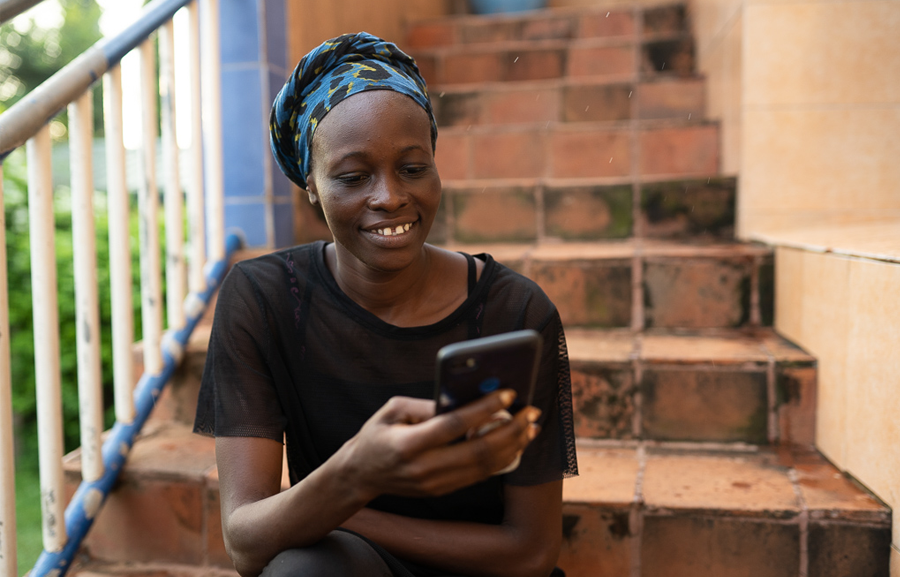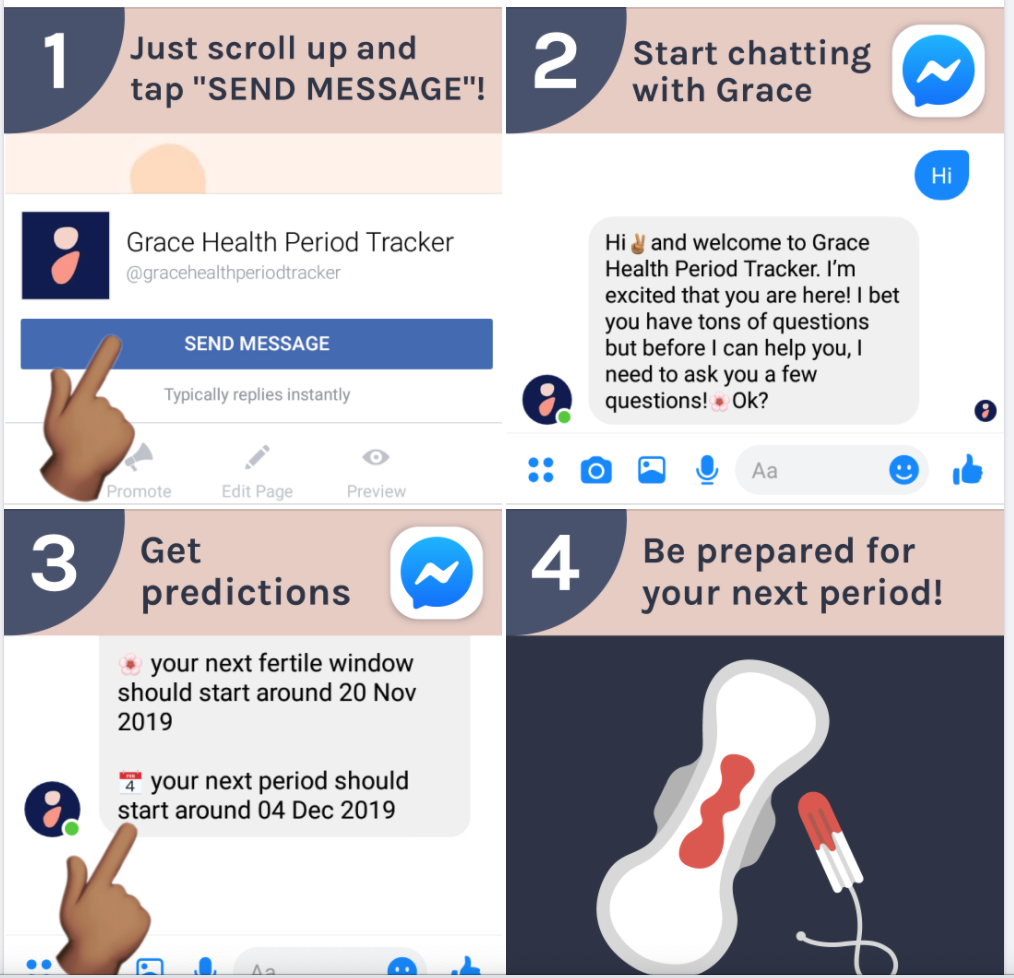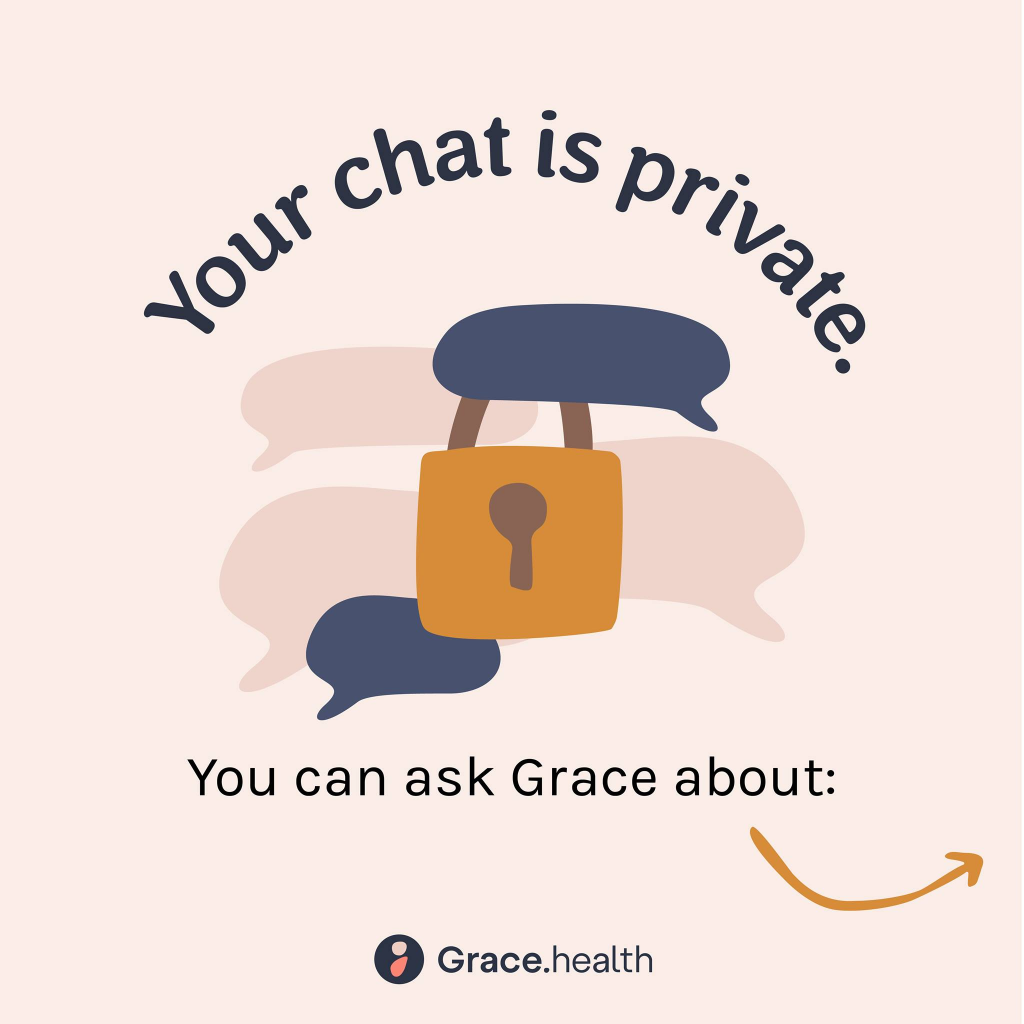We know that mobile internet content can bring invaluable benefits to millions of women worldwide. But developing relevant e-health services for women is not only about making information and services available through an app, a website, SMS or USSD channels; it’s also essential to address the key barriers that women face in accessing mobile internet. In this blog we’ll share some concrete ways in which Grace Health is incorporating digital literacy into our whole product strategy, in order to successfully extend access to sexual and reproductive health information and services to hundreds of thousands of women across low- and middle-income countries.
Source: Grace Health
In 2017, we launched Grace Health, the first ever digital health clinic designed specifically for women in low- and middle-income countries. Our automated health assistant, Grace (available on Facebook Messenger and, just recently, also as an app on Android), is an AI-powered chatbot that helps women track and understand their menstrual cycle, get proactive notifications, tips and reminders as well as explore a wide range of educational content on sexual and reproductive health and rights (SRHR). Since March 2020, the chat also responds to questions on COVID-19 and for our users in Accra (Ghana), the service enables home delivery of essential health products through our partner mPharma. In little over a year since we launched the service to market, 800,000 women, primarily across Nigeria, Ghana and Kenya, have started to use our service to stay informed on their sexual and reproductive health, and our goal is to reach every woman who has a phone.
Developing a digital health assistant that understands and responds to the needs of users
GSMA research shows that some of the key reasons female mobile users in Africa do not use mobile internet include a lack of digital literacy and skills, safety and security concerns, and a lack of perceived relevance. Below I will share a few examples of how Grace Health helps to address these issues and extend access to SRHR.
Relevance: Reproductive health content as an entry point to mobile internet use
From the onset of puberty until the end of menopause, a woman’s reproductive health is absolutely central to her overall wellbeing and life. It can be the source of both angst and discomfort when managing one’s menstruation as well as life altering decisions such as if and when to have children. When it comes to the perceived relevance of mobile internet use to women’s day-to-day lives, sexual and reproductive health information provides an excellent source of content, especially if the content and format is designed for her needs and at her knowledge level. Therefore, it was a natural starting point on our mission to improve healthcare for women worldwide. Since the launch of Grace, we’ve had a steady read-rate of an amazing 65% (meaning 65% of our users are, at minimum, consistently reading our content). Furthermore, 87% of our users say that they learn when using Grace and 93% would recommend us to a friend. Statistics like ours show the natural stickiness of reproductive health content. But beyond the fantastic engagement, our data in combination with user interviews has also revealed another remarkable thing: namely, that some women have been using Grace to not only calculate the expected start date of their own period and ovulation, but also of other women (perhaps women who are not yet using a smartphone or digital period tracking tools). This further strengthens the indication that sexual and reproductive health content is a natural entry point to mobile internet use as it supplies a tangible benefit to women’s lives.
Digital Literacy: Mimicking offline communication behaviours
When deciding on the user interface (UI) of Grace, we saw very early in our user testing that, to our users, a conversational UI was a natural way of seeking and receiving information. In expanding access to critical information to both new and existing smartphone users, we wanted to tap into an already established way of communicating. A back-and-forth format does not only mimic a real conversation, but uses the same familiar digital structure of both SMS and some of the most widely used online applications such as WhatsApp, Facebook Messenger and Telegram. We also tested the more common format of apps, using pre-populated buttons to guide the user in the digital experience but again and again we saw that they were not intuitive to our users. In order to accommodate free-text writing, Grace operates with Natural Language Processing to understand misspellings and local variances in written English.
One of the learnings of developing solutions for less tech-savvy markets is that digital literacy must permeate the whole user journey, even outside of the core platform. We incorporate this learning by using all of our social media platforms to educate our users on how to properly use Grace.
Example of Facebook post to help users understand how to track their period with Grace
Safety and Security: Increasing the sense of control
A major benefit of using e-health services, like Grace, to extend access to specifically SRHR information and services, is that it can tackle key barriers that women face when seeking it, such as stigmatisation and discrimination, lack of privacy, embarrassment and high cost of services and transportation. In fact, Grace users’ top three reasons for using the service are that information is instant, private and non-judgemental. However, with a stigmatised and sensitive topic like sexual and reproductive health, safety and security concerns become highly relevant in order for women to dare to take advantage of the content available. Below I share a few concrete ways in which Grace Health is working to address our users’ privacy concerns and increase the sense of control.
Terms of Service that are understandable: We hired a legal designer to make our Terms of Service both visual and easily understandable to someone who is less familiar with using digital health services. We want to empower our women to understand that the data they share with Grace is valuable and that it helps us improve the service.
Nickname for increased privacy: To increase the feeling of discretion and privacy, our users are always able to choose a nickname and don’t need to share any identifiable information when chatting with Grace.
Source: Grace Health
Code to access the Grace app: As phones might sometimes be borrowed by other household members, for the app version of Grace, users will soon have the option to use an access code to prevent anyone who might use the phone from accessing the Grace app.
Conclusion
While a digital health clinic for women cannot replace physical health services, it can serve as a complement to help strengthen weak health systems by helping women access fundamental information and services that are critical to their health and overall life. The lack of health data on women and girls is a problem across the world and especially in low- and middle-income countries. One of the major benefits of Grace being a digital service, is that we can collect aggregated data in real time on users’ behaviours, needs and questions. Due to COVID-19, Ghana, one of the countries where Grace Health has reached high usage, faced a complete lockdown from 30 March 2020 to 20 April 2020 in its two largest cities. Immediately, we could see a clear spike in requests for pregnancy option information in the Grace chat, showing us how e-health services can be instrumental in discovering user needs and uncovering health concerns. Furthermore, the social and accessible character of mobile technology gives it yet another advantage over traditional healthcare in that it can quickly disseminate new and rapidly changing information. In a health crisis like the current one this is absolutely crucial. With Grace, we can bring up-to-date and easily digestible information directly into each user’s home and phone.
More than 1.6 billion women of fertile age (15-49) live in low-and middle-income countries around the world and at Grace Health we see how mobile technology truly has the potential to be part of transforming the health journey for millions of those women. During 2021, we look forward to furthering the knowledge on how to develop more inclusive and relevant e-health services for women across the globe.





